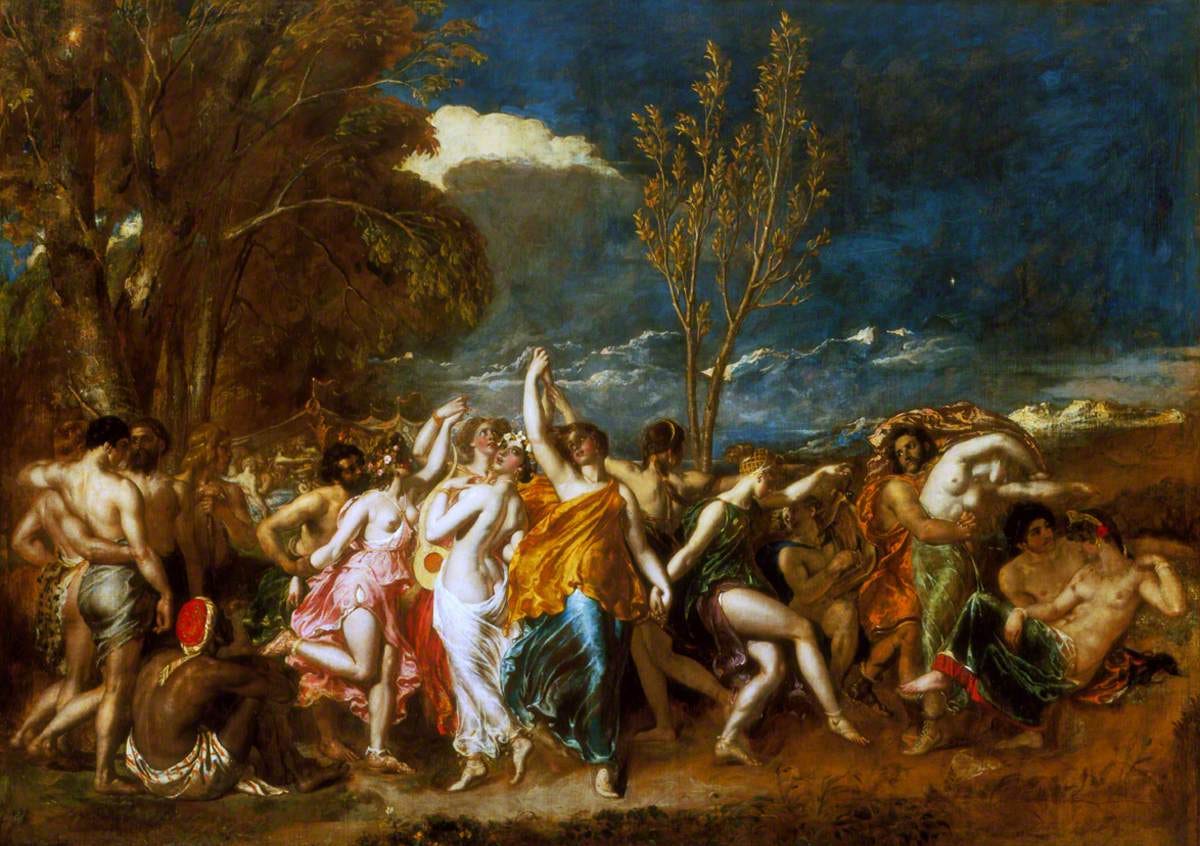Draft of Genesis 6:1-6
The Holy One, blessed be He, turned into a bear lying in wait for me. (And were the Nephilim so large because they were fed better as children?)
I apologize again for the delay between posts! I paused paid subscriptions for 4 months so that no one would be charged and get only silence in return. Over this time I haven’t been a total slouch: I wrote a few short fictions and a poem. But It’s good to return to translating Bible.
Before I begin chapter 6, I want to mention a remarkable line from Rashi I encountered this week, in his commentary on Lamentations. Regarding Lamentations 3:10 he writes,
דוב אורב הוא לי: 1הקב"ה נהפך לי לדוב אורב (He is to me a bear lying in wait: The Holy One, blessed be He, turned into a bear lying in wait for me.)
This is a paraphrase. I don’t think Rashi is talking about himself when he writes for me, but it brings to mind Delmore Schwartz’s “The Heavy Bear Who Goes With Me".2 Schwartz was certainly familiar with the verse, and it’s not altogether unreasonable to think he was familiar with Rashi.3
But onto chapter 6:
Time gone by
Man began
to profane
to multiply
on Earth
Born to them
daughters
Sons of God saw
daughters
of man
their beauty
took them
as wives
The Lord said
"My spirit will not subdue
man
forever
Enfleshed
his days are but
one-hundred and twenty years"
Those days
giants walked
the earth
Sons of God went
to daughters
of man
Their children were great men
of that age
men of the Name
The Lord saw
the wicked multiply
among earthly man
Every thought
in man's heart
was wicked
every day
The Lord lay to heart
his making
earthly man
It vexed him
There’s a lot of interest in the Sons of God (בְנֵי־הָֽאֱלֹהִים) and the Giants/Nephilim (הַנְּפִלִים). There’s not much in the text of the chapter itself to explain who or what they are.
St. Augustine helps us make sense of them:
All that we indubitably know, from the authentic Scripture in the Hebrew and Christian traditions, is the fact that in the period before the flood there were many giants, all of whom belonged to the earthly city in human society, and that there were sons of God descended from Seth who abandoned their holiness and sank down into this city of men. There is nothing surprising in the fact that giants could be born from men like that. In any case, they were not all giants, even though there were more giants before the flood than in all subsequent ages. They served a divine purpose in that they reveal to anyone who is wise that mere bodily magnitude and might have no more value than bodily beauty.4
There is no difficulty, then, about giants being born even before the sons of God or the so-called angels or the sons of Seth had carnal commerce with the daughters of men, which is to say, with women living a worldly life, or more plainly, descendants of Cain.5
So too does St. Ephrem of Syria, albeit with a different reading:
The house of Cain, because the earth had been cursed so as not to give them its strength, produced small harvests, deprived of its strength, just as it is today that some seeds, fruits and grasses give strength and some do not. Because at that time they were cursed and sons of the cursed and were dwelling in the land of curses, they would gather and eat produce that lacked nutrition, and those who ate these were without strength just like the food that they ate. As for the Sethites, on the other hand, because they were the descendants of the blessed [Seth] and were dwelling in the land along the boundary of the fence of paradise, their produce was abundant and full of strength. So too were the bodies of those who ate that produce strong and powerful.6
So the size of the Nephilim was merely a matter of nutrition! (Rashi disagrees and calls them fallen angels: “Thy were called נפילים because they fell (נפלו) and caused the downfall of (הפילו) the world.”)
I don’t know. The text of Genesis is written in such a way to keep the giants a mystery.
Read more about my translation of Genesis 6:4 -
Men of the Name
Genesis 6:4 tells of the אַנְשֵׁ֥י הַשֵּֽׁם / οἱ ἄνθρωποι οἱ ὀνομαστοί / viri famosi, which I translate as men of the Name. My rendering is extremely “literal”; הַשֵּֽׁם means “the Name”. It’s also mysterious, just as these men are mysterious. Almost every other translation offers instead
הקב"ה is an abbreviation of הַקָּדוֹשׁ בָּרוּךְ הוּא (the Holy One, Blessed is He).
“The heavy bear who goes with me, / A manifold honey to smear his face…” https://www.poetryfoundation.org/poems/42637/the-heavy-bear-who-goes-with-me. (This is just riffing on a poem that came to mind; Schwartz’s bear is his drinking and madness, not the Holy One.)
Schwartz called himself a historian of Jewish immigration. Also of note: “His most ambitious work was a failed book-length autobiographical poem called Genesis.”
Louth, Andrew – Conti, M. (ed.), Genesis 1–11 (Ancient Christian Commentary on Scripture; Downers Grove, IL 2001) 125-126.
Augustine of Hippo, The City of God, Books VIII–XVI (ed. H. Dressler) (The Fathers of the Church; Washington, DC 1952) XIV, 472.
Louth, Andrew – Conti, M. (ed.), Genesis 1–11 (Ancient Christian Commentary on Scripture; Downers Grove, IL 2001) 124.





